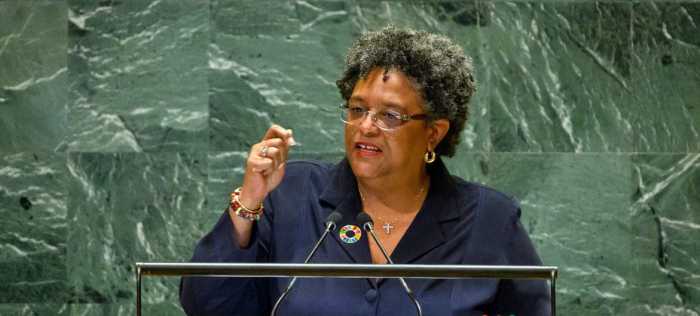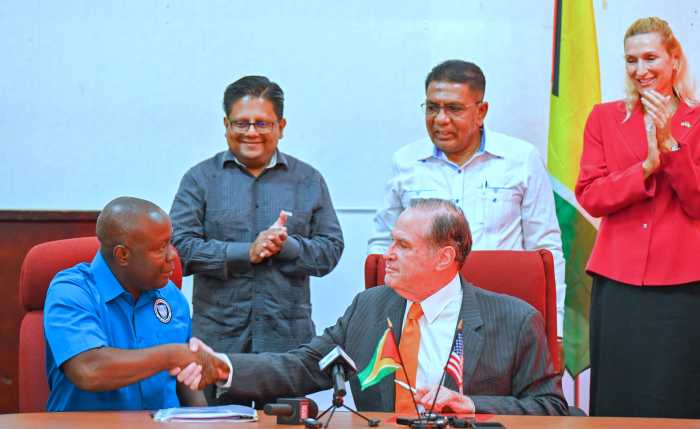Antigua
The United States government, in collaboration with the government of Antigua and Barbuda recently launched a Police Records Management Information System (PRMIS), which is designed to help the Police Force to improve data management and analysis.
PRMIS will be piloted in two police stations — the Dockyard and St. John Police Stations.
It will ultimately strengthen police response to support crime reduction using such measures as geo-mapping and victim and offender profiling.
The system is a key component of the United States Agency for International Development’s (USAID) CariSECURE project.
CariSECURE is a component of USA’s wider Youth Empowerment Services (YES) Project, which aims to reduce youth involvement in the Caribbean. It is implemented by the United Nations Development program (UNDP).
PRMIS uses standardized crime and violence data to foster evidence-based policy and programing across eight eastern and southern Caribbean countries, including Antigua and Barbuda.
These countries will benefit from customized software that allows for cross country comparisons and generates high quality data to support cohesive regional crime strategies and responses.
Antigua and Barbuda is the fifth country to launch the PRMIS.
Barbados
The Barbados-based Caribbean Institute for Meteorology and Hydrology (CIMH) said that while there is less concern over short-term drought, there remains such concern over long-term drought as the end of the year approaches.
In its latest Caribbean Drought Bulletin released recently in Barbados said the drought situation is of even more concern given that the wet season is also coming to an end.
The CIMH said the long-term drought situation — by the end of November 2019 — is of immediate concern in south-eastern Belize, while noting that the long-term drought is evolving in Antigua, Barbados, norther and central Belize, Dominica, French Guiana, Grenada, St. Kitts and Trinidad and Tobago.
It said that long-term drought might possibly continue in Hispaniola and Martinique and might also develop in northern Puerto Rico, St. Martin, St. Vincent and the United States Virgin Islands.
In a review of the situation in the region for August, the CIMH said there were mixed conditions seen throughout the islands of the eastern Caribbean.
Caribbean
India is providing a US$150 million line of credit to finance renewable energy and climate change-related projects in the Caribbean Community (Caricom).
This is according to a statement issued by the St. Kitts-Nevis government.
The statement follows a historic summit between India and the 15-member CARICOM grouping that was aimed at deepening the political cooperation among various stakeholders.
CARICOM leaders as well as foreign ministers, who recently attended the 74th session of the United Nations General Assembly (UNGA) met with India’s Prime Minister Narendra Modi, in the first –ever CARICOM-India summit according to the statement.
New Delhi is also making available a US$14 million grant for “quick impact” community development projects within CARICOM.
The Prime Minister of India also announced the establishment of the Regional Center for Excellence in Information Technology in Guyana and the Regional Vocational Training Center in Belize, which are upgrades to the existing India-funded centers in those two countries.
The St. Kitts-Nevis statement said coming out of the meeting a joint task force will be created to map the way forward in deepening relations between Caricom and India on bilateral and regional matters.
Guyana
Guyana says the International Court of Justice (ICJ) will carry out the oral hearings in the case regarding the country’s border dispute with Venezuela from March 23 to 27 next year.
A statement issued by the Ministry of Foreign Affairs said it welcomes the notification by the ICJ on the issue.
The Arbitral Award of 1899 (Guyana v Venezuela) matter will determine whether the court has jurisdiction over the case filed by Guyana on March 29, 2018.
Guyana is seeking to obtain from the ICJ, a final and binding judgement that the 1899 Arbitral Award, which established the location of the land boundary between the then-British Guiana and Venezuela, remains valid and binding and that Guyana’s Essequibo region belongs to Guyana and not Venezuela.
Guyana submitted the case to the court after the UN Secretary General Antonio Guterres determined, that the dispute over the validity of the Arbitral Award and the resulting boundary, must be decided by the court. That constitutes a sufficient jurisdictional basis for the court to proceed.
The century long border dispute escalated in May 2015 when oil was found in disputed waters off the coast of Venezuela.
Jamaica
Agriculture Minister Audley Shaw says Jamaica will be partnering with the Harvard International Phytomedicines and the Medical Cannabis Institute (HIPI) in the US on initiatives aimed at improving the country’s competitiveness in the global cannabis industry.
Shaw, in making the disclosure, said representatives of HIPI will be visiting the island this month as part of the impending arrangement.
Speaking at the opening of the CanEx Business Conference and Expo in the western capital of Montego Bay recently, Shaw said the administration is committed to developing the local cannabis industry in a holistic manner, which will bring economic benefits for Jamaicans.
Trinidad
Attorney General Faris-al-Rawi said he has written to the European Union (EU) seeking to remove Trinidad and Tobago from its blacklist of countries it deems to be tax havens.
Al Rawi said Trinidad and Tobago would be taking the matter to Brussels, where many of the EU institutions are headquartered.
He expressed confidence that in the short run as the country comes to the end of that process that Trinidad and Tobago, from an FATF (Financial Action Task Force) position, “will no longer be on the list because of the amount of work we have done. We have done a significant amount of work in this area.”
Al-Rawi explained that the blacklisting by the EU was a combination of two events. Firstly it was influenced by Trinidad and Tobago’s position in relation to the Global Forum on Transparency and Exchange of Information for Tax Purposes, with which Trinidad and Tobago was not compliant.
He said this was due to the fact that the former Kamla Persad-Bissessar administration committed the country to become Global Forum compliant in 2011 but did not do the work required to achieve this.
The attorney general said the second element of the EU blacklisting was based on the use of the FATF listing to treat T&T and countries like the British Virgin Islands negatively.
He said that good standing with FATF was all tied to the government’s (legislative) agenda, which included anti-terrorist reform, criminal justice reform, prosecutions, beneficial ownership and civil forfeiture.
“All these things have been met with approval by the FATF, because it matched the concerns that they (the FATF) had also raised,” Al-Rawi said.
— Compiled by Azad Ali

























